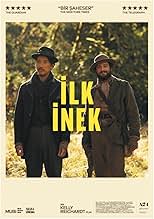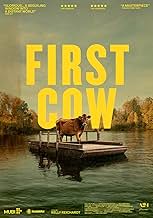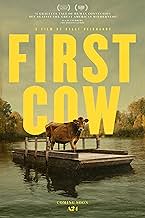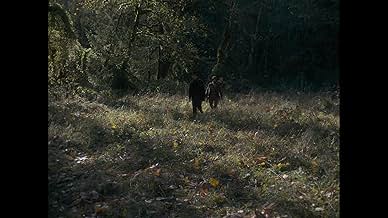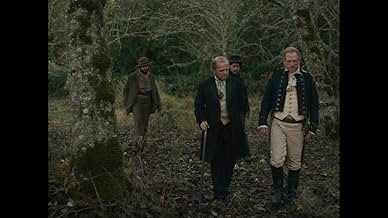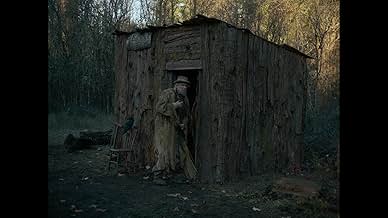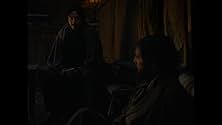AVALIAÇÃO DA IMDb
7,1/10
23 mil
SUA AVALIAÇÃO
Um cozinheiro habilidoso viajou para o oeste e se juntou a um grupo de caçadores de peles, ele só encontra uma conexão verdadeira com um imigrante chinês que também procura sua fortuna. Logo... Ler tudoUm cozinheiro habilidoso viajou para o oeste e se juntou a um grupo de caçadores de peles, ele só encontra uma conexão verdadeira com um imigrante chinês que também procura sua fortuna. Logo os dois colaboram em um negócio de sucesso.Um cozinheiro habilidoso viajou para o oeste e se juntou a um grupo de caçadores de peles, ele só encontra uma conexão verdadeira com um imigrante chinês que também procura sua fortuna. Logo os dois colaboram em um negócio de sucesso.
- Direção
- Roteiristas
- Artistas
- Prêmios
- 21 vitórias e 141 indicações no total
Rene Auberjonois
- Man with Raven
- (as René Aubergenois)
Kevin Michael Moore
- Fort Trapper
- (as Kevin-Michael Moore)
Avaliações em destaque
The movie begins with a modern day scene, we know the period only because we see a modern ship on the river. Then soon a skull is discovered and then two adult skeletons laying side by side in either a shallow grave, or maybe just covered by debris over the past 150+ years.
Most of the story is in the 1800s as explorers travel west to build a new life and perhaps find some of that gold. Gradually two men become friends, one a Chinaman the other a man from Maryland trained as a cook after being orphaned. When the first cow shows up, owned by a wealthy man, the two hatch a plan to form a business.
It is a nice story of friendship and cooperation to overcome obstacles, but as the period would dictate the men are dirty, the scenes are unattractive, and the story often moves quite slowly. It is almost 2 hours and I found myself wishing it had been 80 to 90 minutes.
The user reviews are quite polarized, many love it while many hate it. I can understand both extremes, I am somewhere in the middle.
My wife and I watched it at home on BluRay from my local library.
Most of the story is in the 1800s as explorers travel west to build a new life and perhaps find some of that gold. Gradually two men become friends, one a Chinaman the other a man from Maryland trained as a cook after being orphaned. When the first cow shows up, owned by a wealthy man, the two hatch a plan to form a business.
It is a nice story of friendship and cooperation to overcome obstacles, but as the period would dictate the men are dirty, the scenes are unattractive, and the story often moves quite slowly. It is almost 2 hours and I found myself wishing it had been 80 to 90 minutes.
The user reviews are quite polarized, many love it while many hate it. I can understand both extremes, I am somewhere in the middle.
My wife and I watched it at home on BluRay from my local library.
For those viewers who believe the pace of the film is "slow", yes, there are no car chases. Instead, this film has a depth of character and original development that creates a mood so beautifully of the time and place. It is refreshing to have a plot that keeps the viewer's interest throughout. When the majority of movie offerings out there are pure trash, this film is a real treat.
Thanks to constant mental stimulation due to social media, cell phones, and online content always being available, the majority of people now have an extremely short attention span. If that sounds like you, then don't watch this.
I personally consider myself to be a very patient person, and if you are willing to just be patient and actively appreciate the film you will find this film to be a rich cinematic treat. The cinematography is exquisite, meticulously framed in a 1.33:1 aspect ratio. The performances are extremely watchable - these characters could easily have been rather dull or boring but the brilliant actors elevate them to near-mythological status. The plot, while cliched, is supported so well by the aforementioned elements that it feels like a completely new experience to the other films that have similar plots.
If you only watch films for a quick dopamine hit, this is not the film for you. In order to get anything out of this film, you must put in some of your own thought. Under the surface, the film is rich with ideas about capitalism, the American Dream, and especially male friendship. It's left up to the viewer to interpret the work for themselves, which is what I appreciate most about Kelly Reichardt - she doesn't try to force a message down your throat, she just lets you interpret her films however you want to. But you need to be patient if you want to get a good experience, which many people, especially on this website, don't quite seem to understand.
I personally consider myself to be a very patient person, and if you are willing to just be patient and actively appreciate the film you will find this film to be a rich cinematic treat. The cinematography is exquisite, meticulously framed in a 1.33:1 aspect ratio. The performances are extremely watchable - these characters could easily have been rather dull or boring but the brilliant actors elevate them to near-mythological status. The plot, while cliched, is supported so well by the aforementioned elements that it feels like a completely new experience to the other films that have similar plots.
If you only watch films for a quick dopamine hit, this is not the film for you. In order to get anything out of this film, you must put in some of your own thought. Under the surface, the film is rich with ideas about capitalism, the American Dream, and especially male friendship. It's left up to the viewer to interpret the work for themselves, which is what I appreciate most about Kelly Reichardt - she doesn't try to force a message down your throat, she just lets you interpret her films however you want to. But you need to be patient if you want to get a good experience, which many people, especially on this website, don't quite seem to understand.
A story about two outcasts who find friendship and a business partnership with each other in the American frontier.
John Magaro plays a gentle baker who begins the movie as cook for a prospecting expedition. He's too thoughtful and sensitive to really fit in with the macho wild men he's with, who bully and threaten him. Orion Lee is a Chinese immigrant who befriends him and suggests that they go into business selling the baker's biscuits at a local trading post. The biscuits are a sensation, but the enterprise is a dangerous one -- the only place to get milk is to steal it from the cow (yes, THE cow, not A cow) that belongs to the local aristocrat, played by the always welcome Toby Jones. The film begins in the present day with a hiker in the woods discovering something that hints at how the movie will end, and how the movie then circles back to that find is a small miracle of narrative storytelling.
Kelly Reichardt, who's made a career of quiet, understated films, remains true to form here. "First Cow" shows much more than it tells, which should please fans of art house fare but will probably frustrate more casual moviegoers who have less patience for the way stories are told. The two main characters don't talk much, but we learn much about them, not from what they say, but from how they act. The first time we see Magaro's character, for example, he's hunting for mushrooms in the woods, and he takes the time to set a salamander he finds back on its feet when it's struggling to flip itself over. And when Lee's character shows him to his cabin in the woods, the first thing Magaro does is find some wildflowers with which to decorate the small space. Little flourishes like these reward the patient viewer, and we come to like the two men so much that the end, though we've been warned of it in advance, feels that much more tragic when it comes.
Covid has seen to it that 2020 hasn't exactly been the most robust year for movies, but of movies that have been released so far this year, "First Cow" is one of the best I've seen.
Grade: A
John Magaro plays a gentle baker who begins the movie as cook for a prospecting expedition. He's too thoughtful and sensitive to really fit in with the macho wild men he's with, who bully and threaten him. Orion Lee is a Chinese immigrant who befriends him and suggests that they go into business selling the baker's biscuits at a local trading post. The biscuits are a sensation, but the enterprise is a dangerous one -- the only place to get milk is to steal it from the cow (yes, THE cow, not A cow) that belongs to the local aristocrat, played by the always welcome Toby Jones. The film begins in the present day with a hiker in the woods discovering something that hints at how the movie will end, and how the movie then circles back to that find is a small miracle of narrative storytelling.
Kelly Reichardt, who's made a career of quiet, understated films, remains true to form here. "First Cow" shows much more than it tells, which should please fans of art house fare but will probably frustrate more casual moviegoers who have less patience for the way stories are told. The two main characters don't talk much, but we learn much about them, not from what they say, but from how they act. The first time we see Magaro's character, for example, he's hunting for mushrooms in the woods, and he takes the time to set a salamander he finds back on its feet when it's struggling to flip itself over. And when Lee's character shows him to his cabin in the woods, the first thing Magaro does is find some wildflowers with which to decorate the small space. Little flourishes like these reward the patient viewer, and we come to like the two men so much that the end, though we've been warned of it in advance, feels that much more tragic when it comes.
Covid has seen to it that 2020 hasn't exactly been the most robust year for movies, but of movies that have been released so far this year, "First Cow" is one of the best I've seen.
Grade: A
The film's visual style is impressive but it's story and pacing is what really drags this film down for me. The cinematography is the one aspect I found to be excellent. The framing is on point and impressive and it adds a lot to the film's style. The production design and costumes are also really good here too. These characters look and feel as if they in the 1820s. The performances are also great too. Each character feels believable and works to help tell the story of the film. Although I like all that, the pacing is not very good. It feels incredibly long and tedious without any real majorly satisfying payoff. It's a 2 hour movie that feels like it goes on for 2 and a half hours. If they had cut down some of the scenes, this issue wouldn't be as major as it is. There were some elements of the story I enjoyed and some I found to be pointless. If you like A24 then check it out but don't have your hopes incredibly high for it.
Você sabia?
- Curiosidades"Slow Elk" was suggested as an alternate title, as that's how cattle were known to Oregon's First People. Also, "slow elk" is still a slang term for cattle used by big game hunters in some Western states; for example, "That out-of-stater shot a slow elk by mistake."
- Erros de gravaçãoCookie mentions he would like to have a business in San Francisco. The film is ostensibly set in the 1820s, when the city had not officially been named San Francisco. However, the name had been in use since the 1590s and could have been used at the time the film is set.
- Cenas durante ou pós-créditosThe Cow - Evie
- ConexõesFeatured in WatchMojo: Top 10 Movies of 2020 (So Far) (2020)
Principais escolhas
Faça login para avaliar e ver a lista de recomendações personalizadas
Detalhes
- Data de lançamento
- País de origem
- Central de atendimento oficial
- Idiomas
- Também conhecido como
- First Cow
- Locações de filme
- Empresas de produção
- Consulte mais créditos da empresa na IMDbPro
Bilheteria
- Faturamento bruto nos EUA e Canadá
- US$ 101.068
- Fim de semana de estreia nos EUA e Canadá
- US$ 81.323
- 8 de mar. de 2020
- Faturamento bruto mundial
- US$ 1.380.888
- Tempo de duração
- 2 h 2 min(122 min)
- Cor
- Proporção
- 1.37 : 1
Contribua para esta página
Sugerir uma alteração ou adicionar conteúdo ausente





